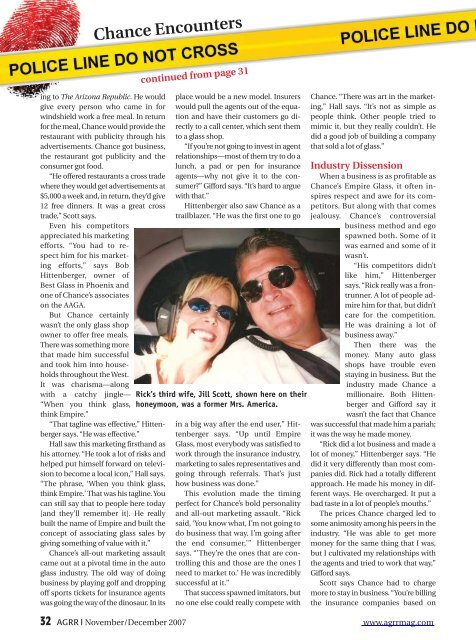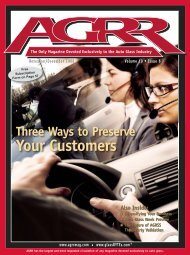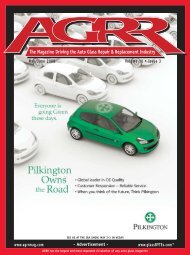AGRR - November/December 2007 - AGRR Magazine
AGRR - November/December 2007 - AGRR Magazine
AGRR - November/December 2007 - AGRR Magazine
You also want an ePaper? Increase the reach of your titles
YUMPU automatically turns print PDFs into web optimized ePapers that Google loves.
Chance Encounterscontinued from page 31ing to The Arizona Republic. He wouldgive every person who came in forwindshield work a free meal. In returnfor the meal, Chance would provide therestaurant with publicity through hisadvertisements. Chance got business,the restaurant got publicity and theconsumer got food.“He offered restaurants a cross tradewhere they would get advertisements at$5,000 a week and, in return, they’d give12 free dinners. It was a great crosstrade,” Scott says.Even his competitorsappreciated his marketingefforts. “You had to respecthim for his marketingefforts,” says BobHittenberger, owner ofBest Glass in Phoenix andone of Chance’s associateson the AAGA.But Chance certainlywasn’t the only glass shopowner to offer free meals.There was something morethat made him successfuland took him into householdsthroughout the West.It was charisma—alongwith a catchy jingle—“When you think glass,think Empire.”“That tagline was effective,” Hittenbergersays. “He was effective.”Hall saw this marketing firsthand ashis attorney. “He took a lot of risks andhelped put himself forward on televisionto become a local icon,” Hall says.“The phrase, ‘When you think glass,think Empire.’ That was his tagline. Youcan still say that to people here today[and they’ll remember it]. He reallybuilt the name of Empire and built theconcept of associating glass sales bygiving something of value with it.”Chance’s all-out marketing assaultcame out at a pivotal time in the autoglass industry. The old way of doingbusiness by playing golf and droppingoff sports tickets for insurance agentswas going the way of the dinosaur. In itsplace would be a new model. Insurerswould pull the agents out of the equationand have their customers go directlyto a call center, which sent themto a glass shop.“If you’re not going to invest in agentrelationships—most of them try to do alunch, a pad or pen for insuranceagents—why not give it to the consumer?”Gifford says. “It’s hard to arguewith that.”Hittenberger also saw Chance as atrailblazer. “He was the first one to goRick’s third wife, Jill Scott, shown here on theirhoneymoon, was a former Mrs. America.in a big way after the end user,” Hittenbergersays. “Up until EmpireGlass, most everybody was satisfied towork through the insurance industry,marketing to sales representatives andgoing through referrals. That’s justhow business was done.”This evolution made the timingperfect for Chance’s bold personalityand all-out marketing assault. “Ricksaid, ‘You know what, I’m not going todo business that way. I’m going afterthe end consumer,’” Hittenbergersays. “’They’re the ones that are controllingthis and those are the ones Ineed to market to.’ He was incrediblysuccessful at it.”That success spawned imitators, butno one else could really compete withChance. “There was art in the marketing,”Hall says. “It’s not as simple aspeople think. Other people tried tomimic it, but they really couldn’t. Hedid a good job of building a companythat sold a lot of glass.”Industry DissensionWhen a business is as profitable asChance’s Empire Glass, it often inspiresrespect and awe for its competitors.But along with that comesjealousy. Chance’s controversialbusiness method and egospawned both. Some of itwas earned and some of itwasn’t.“His competitors didn’tlike him,” Hittenbergersays. “Rick really was a frontrunner.A lot of people admirehim for that, but didn’tcare for the competition.He was draining a lot ofbusiness away.”Then there was themoney. Many auto glassshops have trouble evenstaying in business. But theindustry made Chance amillionaire. Both Hittenbergerand Gifford say itwasn’t the fact that Chancewas successful that made him a pariah;it was the way he made money.“Rick did a lot business and made alot of money,” Hittenberger says. “Hedid it very differently than most companiesdid. Rick had a totally differentapproach. He made his money in differentways. He overcharged. It put abad taste in a lot of people’s mouths.”The prices Chance charged led tosome animosity among his peers in theindustry. “He was able to get moremoney for the same thing that I was,but I cultivated my relationships withthe agents and tried to work that way,”Gifford says.Scott says Chance had to chargemore to stay in business. “You’re billingthe insurance companies based on32 <strong>AGRR</strong> <strong>November</strong>/<strong>December</strong> <strong>2007</strong> www.agrrmag.com





